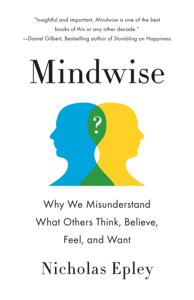
Want to learn the ideas in Mindwise better than ever? Read the world’s #1 book summary of Mindwise by Nicholas Epley here.
Read a brief 1-Page Summary or watch video summaries curated by our expert team. Note: this book guide is not affiliated with or endorsed by the publisher or author, and we always encourage you to purchase and read the full book.
Video Summaries of Mindwise
We’ve scoured the Internet for the very best videos on Mindwise, from high-quality videos summaries to interviews or commentary by Nicholas Epley.
1-Page Summary of Mindwise
Overview
We are all mind readers. We can figure out what others want to say.
While you may think that understanding others is simple, the truth is that we all make mistakes when it comes to reading each other’s minds.
In Mindwise, you’ll explore why we make common errors when trying to understand each other. You’ll discover the reasons behind these mistakes and how they affect our lives.
If you want to be a better mind reader, then the following points will help. First, learn how your own mind works. Second, understand that even if you think you’re right about something, it doesn’t mean that you actually are.
In this passage, you will find out why a positive attitude towards aging is important; how tripping in public should not be embarrassing for you; and that talking to your car makes it hard to sell.
Big Idea #1: We are often too confident that we understand our own minds.
You might be able to guess what your partner is thinking when she frowns at you, but the truth is that you can only do so because of your own knowledge and experience. You also might think that you know yourself well, but in reality, there are many processes going on inside your head that aren’t available to your conscious mind. Even though we assume we have access to our own mental processes, most things happen unconsciously or beyond our control.
The mind makes connections between things, so if you show someone the word “me” and then ask him what comes next in “go_ _,” he’ll write out “good.”
If you associate “me” with “good,” then you will be happy.
Because we associate things with ourselves, we may think that our self-image is based on such associations. However, there’s a problem with this: We can’t access the thought processes behind those associations completely. Thus, to explain why we do what we do, we come up with stories and explanations for our behavior. In one study people were shown photos of two different people and asked to pick which person they found more attractive (1). Later they were given another photo and told it was the one they’d previously chosen (2), though in reality it wasn’t; it was actually the other person from before (3). Surprisingly only 27% realized their mistake when questioned about their choice (4), while 73% had an explanation for choosing the photo they did even though it wasn’t really theirs at all!
People explain their own actions in the same way that they try to read other people’s minds. They observe what they do and then come up with an explanation for it.
Big Idea #2: We often think we know more about others than we actually do.
As we’ve seen, we don’t know what’s going on in our own minds. We also can’t understand other people’s thoughts and feelings very well either. For example, it is difficult to figure out whether someone likes you or not. If you work in an office, however, it is possible to gauge if your coworkers like you as a group or not. It is much more difficult to tell how individuals feel about you though; for instance, it wouldn’t be easy to tell if that guy from IT really likes you or he’s just pretending.
But how can we know what our friends and family are thinking? We have a better chance of reading their thoughts than those of strangers.
Of course, we can’t know everything about people. We don’t even know them as well as we think we do. It’s just an illusion that knowing more about a person gives you the ability to read their mind better.
In a study, participants viewed videos of people who were either lying or telling the truth about being HIV-negative. They then had to determine whether they were lying. The results showed that participants correctly identified liars 52 percent of the time at best and became more confident in their predictions after receiving extra information, but this did not help them identify the liars any better.





